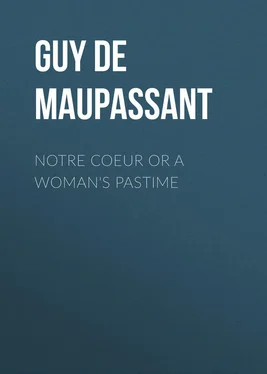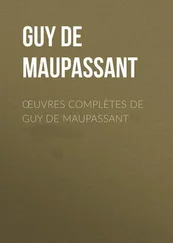Guy Maupassant - Notre Coeur or A Woman's Pastime
Здесь есть возможность читать онлайн «Guy Maupassant - Notre Coeur or A Woman's Pastime» — ознакомительный отрывок электронной книги совершенно бесплатно, а после прочтения отрывка купить полную версию. В некоторых случаях можно слушать аудио, скачать через торрент в формате fb2 и присутствует краткое содержание. Издательство: Иностранный паблик, Жанр: literature_19, foreign_antique, foreign_prose, на английском языке. Описание произведения, (предисловие) а так же отзывы посетителей доступны на портале библиотеки ЛибКат.
- Название:Notre Coeur or A Woman's Pastime
- Автор:
- Издательство:Иностранный паблик
- Жанр:
- Год:неизвестен
- ISBN:нет данных
- Рейтинг книги:3 / 5. Голосов: 1
-
Избранное:Добавить в избранное
- Отзывы:
-
Ваша оценка:
- 60
- 1
- 2
- 3
- 4
- 5
Notre Coeur or A Woman's Pastime: краткое содержание, описание и аннотация
Предлагаем к чтению аннотацию, описание, краткое содержание или предисловие (зависит от того, что написал сам автор книги «Notre Coeur or A Woman's Pastime»). Если вы не нашли необходимую информацию о книге — напишите в комментариях, мы постараемся отыскать её.
Notre Coeur or A Woman's Pastime — читать онлайн ознакомительный отрывок
Ниже представлен текст книги, разбитый по страницам. Система сохранения места последней прочитанной страницы, позволяет с удобством читать онлайн бесплатно книгу «Notre Coeur or A Woman's Pastime», без необходимости каждый раз заново искать на чём Вы остановились. Поставьте закладку, и сможете в любой момент перейти на страницу, на которой закончили чтение.
Интервал:
Закладка:
In the romances which followed, dating from 1888 to 1890, a sort of calm despair seems to have settled down upon De Maupassant's attitude toward life. Psychologically acute as ever, and as perfect in style and sincerity as before, we miss the note of anger. Fatality is the keynote, and yet, sounding low, we detect a genuine subtone of sorrow. Was it a prescience of 1893? So much work to be done, so much work demanded of him, the world of Paris, in all its brilliant and attractive phases, at his feet, and yet – inevitable, ever advancing death, with the question of life still unanswered.
This may account for some of the strained situations we find in his later romances. Vigorous in frame and hearty as he was, the atmosphere of his mental processes must have been vitiated to produce the dainty but dangerous pessimism that pervades some of his later work. This was partly a consequence of his honesty and partly of mental despair. He never accepted other people's views on the questions of life. He looked into such problems for himself, arriving at the truth, as it appeared to him, by the logic of events, often finding evil where he wished to find good, but never hoodwinking himself or his readers by adapting or distorting the reality of things to suit a preconceived idea.
Maupassant was essentially a worshiper of the eternal feminine. He was persuaded that without the continual presence of the gentler sex man's existence would be an emotionally silent wilderness. No other French writer has described and analyzed so minutely and comprehensively the many and various motives and moods that shape the conduct of a woman in life. Take for instance the wonderfully subtle analysis of a woman's heart as wife and mother that we find in "Une Vie." Could aught be more delicately incisive? Sometimes in describing the apparently inexplicable conduct of a certain woman he leads his readers to a point where a false step would destroy the spell and bring the reproach of banality and ridicule upon the tale. But the catastrophe never occurs. It was necessary to stand poised upon the brink of the precipice to realize the depth of the abyss and feel the terror of the fall.
Closely allied to this phase of Maupassant's nature was the peculiar feeling of loneliness that every now and then breaks irresistibly forth in the course of some short story. Of kindly soul and genial heart, he suffered not only from the oppression of spirit caused by the lack of humanity, kindliness, sanity, and harmony which he encountered daily in the world at large, but he had an ever abiding sense of the invincible, unbanishable solitariness of his own Inmost self. I know of no more poignant expression of such a feeling than the cry of despair which rings out in the short story called "Solitude," in which he describes the insurmountable barrier which exists between man and man, or man and woman, however intimate the friendship between them. He could picture but one way of destroying this terrible loneliness, the attainment of a spiritual – a divine – state of love, a condition to which he would give no name utterable by human lips, lest it be profaned, but for which his whole being yearned. How acutely he felt his failure to attain his deliverance may be drawn from his wail that mankind has no universal measure of happiness.
"Each one of us," writes De Maupassant, "forms for himself an illusion through which he views the world, be it poetic, sentimental, joyous, melancholy, or dismal; an illusion of beauty, which is a human convention; of ugliness, which is a matter of opinion; of truth, which, alas, is never immutable." And he concludes by asserting that the happiest artist is he who approaches most closely to the truth of things as he sees them through his own particular illusion.
Salient points in De Maupassant's genius were that he possessed the rare faculty of holding direct communion with his gifts, and of writing from their dictation as it was interpreted by his senses. He had no patience with writers who in striving to present life as a whole purposely omit episodes that reveal the influence of the senses. "As well," he says, "refrain from describing the effect of intoxicating perfumes upon man as omit the influence of beauty on the temperament of man."
De Maupassant's dramatic instinct was supremely powerful. He seems to select unerringly the one thing in which the soul of the scene is prisoned, and, making that his keynote, gives a picture in words which haunt the memory like a strain of music. The description of the ride of Madame Tellier and her companions in a country cart through a Norman landscape is an admirable example. You smell the masses of the colza in blossom, you see the yellow carpets of ripe corn spotted here and there by the blue coronets of the cornflower, and rapt by the red blaze of the poppy beds and bathed in the fresh greenery of the landscape, you share in the emotions felt by the happy party in the country cart. And yet with all his vividness of description, De Maupassant is always sober and brief. He had the genius of condensation and the reserve which is innate in power, and to his reader could convey as much in a paragraph as could be expressed in a page by many of his predecessors and contemporaries, Flaubert not excepted.
Apart from his novels, De Maupassant's tales may be arranged under three heads: Those that concern themselves with Norman peasant life; those that deal with Government employees (Maupassant himself had long been one) and the Paris middle classes, and those that represent the life of the fashionable world, as well as the weird and fantastic ideas of the later years of his career. Of these three groups the tales of the Norman peasantry perhaps rank highest. He depicts the Norman farmer in surprisingly free and bold strokes, revealing him in all his caution, astuteness, rough gaiety, and homely virtue.
The tragic stage of De Maupassant's life may, I think, be set down as beginning just before the drama of "Musotte" was issued, in conjunction with Jacques Normand, in 1891. He had almost given up the hope of interpreting his puzzles, and the struggle between the falsity of the life which surrounded him and the nobler visions which possessed him was wearing him out. Doubtless he resorted to unwise methods for the dispelling of physical lassitude or for surcease from troubling mental problems. To this period belong such weird and horrible fancies as are contained in the short stories known as "He" and "The Diary of a Madman." Here and there, we know, were rising in him inklings of a finer and less sordid attitude 'twixt man and woman throughout the world and of a purer constitution of existing things which no exterior force should blemish or destroy. But with these yearningly prophetic gleams came a period of mental death. Then the physical veil was torn aside and for Guy de Maupassant the riddle of existence was answered.
Robert Arnot
NOTRE CŒUR
CHAPTER I.
THE INTRODUCTION
One day Massival, the celebrated composer of "Rebecca," who for fifteen years, now, had been known as "the young and illustrious master," said to his friend André Mariolle:
"Why is it that you have never secured a presentation to Mme. Michèle de Burne? Take my word for it, she is one of the most interesting women in new Paris."
"Because I do not feel myself at all adapted to her surroundings."
"You are wrong, my dear fellow. It is a house where there is a great deal of novelty and originality; it is wide-awake and very artistic. There is excellent music, and the conversation is as good as in the best salons of the last century. You would be highly appreciated – in the first place because you play so well on the violin, then because you have been very favorably spoken of in the house, and finally because you have the reputation of being select in your choice of friends."
Читать дальшеИнтервал:
Закладка:
Похожие книги на «Notre Coeur or A Woman's Pastime»
Представляем Вашему вниманию похожие книги на «Notre Coeur or A Woman's Pastime» списком для выбора. Мы отобрали схожую по названию и смыслу литературу в надежде предоставить читателям больше вариантов отыскать новые, интересные, ещё непрочитанные произведения.
Обсуждение, отзывы о книге «Notre Coeur or A Woman's Pastime» и просто собственные мнения читателей. Оставьте ваши комментарии, напишите, что Вы думаете о произведении, его смысле или главных героях. Укажите что конкретно понравилось, а что нет, и почему Вы так считаете.












